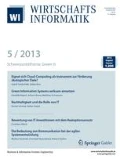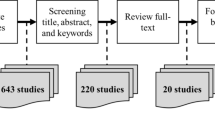Abstract
For many companies, the development of a competitive E-Commerce strategy and even more so its implementation is a huge challenge. This paper presents a method that is aimed at reducing substantially cost and risk of such an endeavour. The method has been adapted from an existing method for multi-perspective enterprise modelling. It supports strategy analysis and design as well as the corresponding organisational design. It also fosters the configuration of supporting information systems. Besides specialized process models, the method offers reference models for strategy design and a library of business process models. The process models can be transformed automatically into workflow schemata.
Similar content being viewed by others
Literatur
Becker, J.; Schütte, R.: Handelsinformationssysteme. 2. Auflage, Redline Wirtschaft, Frankfurt/M. 2004.
EC-Cockpit Bedienungsanleitung, 2000. http://www.iwi.uni-sb.de/ec-cockpit/Download/DL_2_0/EC-Cockpit_2_Bedienungsanleitung.pdf, Abruf am 2004-02-10.
Feeny, D.: Making Business Sense of the E-Opportunity. In: Brynjolfsson, E.; Urban, G.L. (Eds.): Strategies for e-business success. Jossey Bass: San Francisco 2001, S. 35–60.
De Figueiredo, J. M.: Finding Sustainable Profitability in Electronic Commerce. In: Brynjolfsson; E.; Urban, G. L. (Hrsg.): Strategies for e-business success. Jossey Bass: San Francisco 2001, S. 7–33.
Frank, U.: Enriching Object-Oriented Methods with Domain Specific Knowledge: Outline of a Method for Enterprise Modelling. Arbeitsberichte des Instituts für Wirtschaftsinformatik, Nr. 4, 1997.
Frank, U.: The Memo Object Modelling Language (MEMO-OML), Arbeitsberichte des Instituts für Wirtschaftsinformatik, Nr. 10, Koblenz 1998.
Frank, U.: Entwurf eines Referenzmodells für Handelsplattformen im Internet. In: Tagungsband der Fachtagung KnowTech, Leipzig 2000.
Frank, U.: Multi-Perspective Enterprise Modeling (MEMO) — Conceptual Framework and Modeling Languages. In: Proceedings of the Hawaii International Conference on System Sciences (HICSS-35), Honolulu 2002.
Frank, U.; Jung, J.: The MEMO-Organisation Modelling Language (OrgML). Arbeitsberichte des Instituts für Wirtschaftsinformatik, Nr. 47, Koblenz 2004.
Frank, U.; Lange, C.: A Framework to Support the Analysis of Strategic Options for Electronic Commerce. Arbeitsberichte des Instituts für Wirtschaftsinformatik, Nr. 41, Koblenz 2004.
Frank, U.; van Laak, B.: Anforderungen an Sprachen zur Modellierung von Geschäftsprozessen. Arbeitsberichte des Instituts für Wirtschaftsinformatik, Nr. 34, Koblenz 2003.
Haertsch, P.: Wettbewerbsstrategien für Electronic Commerce: Eine kritische Überprüfung klassischer Strategiekonzepte, Köln 2000; zugleich Diss. Universität St. Gallen 2000.
Hevner, A. R.; March, S. T.; Park, J.; Ram, S.: Design Science in Information Systems Research. In: MIS Quarterly, 28 (2004) 1, S. 75–105.
Jung, J.; Kirchner, L.: A Framework for Modelling E-Business Resources. Arbeitsberichte des Instituts für Wirtschaftsinformatik, Nr. 44, Koblenz 2004.
Lange, C.: Developing Strategies for Electronic Commerce in Small and Medium Sized Companies — Guidelines for Managers. Arbeitsberichte des Instituts für Wirtschafts-informatik, Nr. 39, Koblenz 2003.
Lucas, H. C.: Strategies for Electronic Commerce and the Internet. Boston: The MIT Press 2002.
Malone, T. W. et al.: Toward a handbook of organizational processes. In: Management Science, 45 (1999) 3, S. 425–443.
Porter, M. E.: Competitive Advantage: Creating and Sustaining Superior Performance. Free Press: New York 1985.
Thome, R.; Schütz, S.; Zeißler, G.: Ermittlung betriebswirtschaftlicher Anforderungen zur Definition von Geschäftsprozessprofilen. FORWIN FWN-2001-010, 2001.
Thome, R.; Hennig, A.; Ollmer, C.: Kategorisierung von eC-Geschäftsprozessen zur Identifikation geeigneter eC-Komponenten für die organisierte Integration von Standardanwendungssoftware, FORWIN FWN-2000-011, Bayrischer Forschungsverbund Wirtschaftsinformatik, 2000.
Van der Aalst, W. M. P.; Basten, T.: Lifecycle Inheritance: A Petri-net-based Approach. In: Azema, P.; Balbo, G. (Eds.): Application and Theory of Petri Nets 1997, Lecture Notes in Computer Science, volume 1248. Berlin 1997, S. 62–81.
Van der Aalst, W. M. P.; Basten, T.: Inheritance of workflows: an approach to tackling problems related to change. In: Theoretical Computer Science 270, (1–2), 2002, S. 125–203.
VICS: White Paper #1, 1998, www.cpfr.org/WhitePapers/19971201.html am 16.1.2004, Abruf am 2004-01-16.
Wamser, Ch.: Strategisches Electronic Commerce — Wettbewerbsvorteile auf elektronischen Märkten. Wiesbaden 2001.
WfMC (Ed.): Workflow Process Definition Interface — XML Process Definition Language. Doc. No. WFMC-TC-1025, 1.0 Final Draft 2002, http://www.wfmc.org/standards/docs/TC-1025_10_xpdl_102502.pdf, Abruf am 2004-01-16.
Wyner, G. M.; Lee, J.: Process Specialization: Defining Specialization for State Diagrams. In: Computational and Mathematical Organization Theory, 8 (2002) 2, S. 133–155.
Author information
Authors and Affiliations
Corresponding author
Rights and permissions
About this article
Cite this article
Frank, U. E-MEMO: Referenzmodelle zur ökonomischen Realisierung leistungsfähiger Infrastrukturen für Electronic Commerce. Wirtschaftsinf 46, 373–381 (2004). https://doi.org/10.1007/BF03250950
Published:
Issue Date:
DOI: https://doi.org/10.1007/BF03250950




